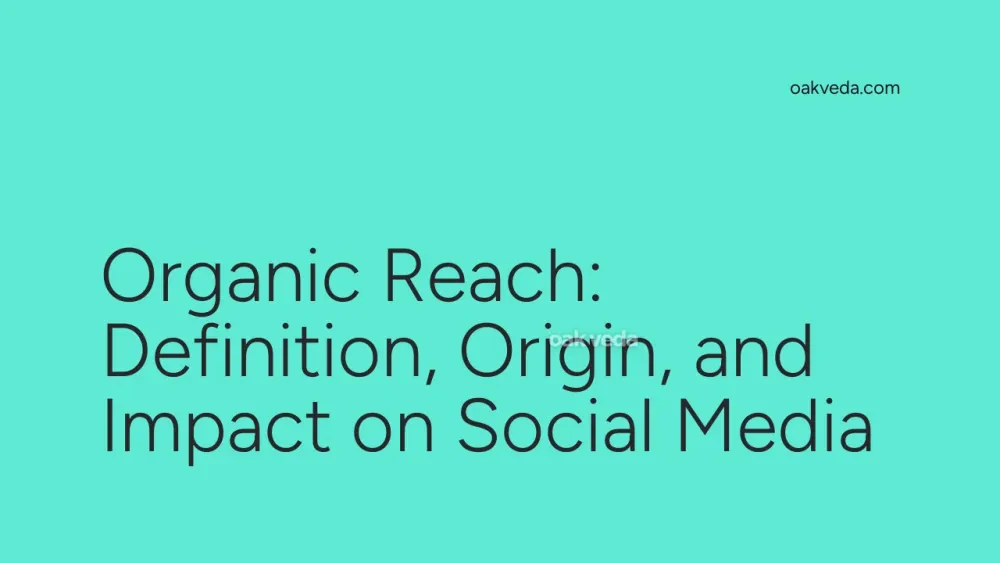
What is Organic Reach?
Organic reach refers to the number of unique users who see and engage with your social media content without any paid promotion or advertising. It represents the natural, unpaid distribution of your posts, videos, or other content to your audience based on the algorithms and rules of each social media platform.
Origin and Development of Organic Reach
The concept of organic reach emerged alongside the rise of social media platforms in the mid-2000s. Initially, platforms like Facebook and Twitter displayed content chronologically, allowing most posts to reach a significant portion of a user's followers. However, as these platforms grew and introduced algorithmic feeds, organic reach began to decline, prompting marketers to adapt their strategies.
How Organic Reach Works
Organic reach is determined by complex algorithms unique to each social media platform. These algorithms consider various factors, including:
- Content relevance
- User engagement (likes, comments, shares)
- Post timing
- User preferences and behavior
- Content type (text, image, video)
- Account authority and credibility
When you publish content, the platform's algorithm decides which users' feeds or timelines to display it in, based on these factors.
Types of Organic Reach
While organic reach is a singular concept, it can be categorized based on the platform and content type:
- Post Reach: The number of unique users who see a specific post
- Page Reach: The total number of unique users who see any content from your page over a given period
- Story Reach: Applicable to platforms like Instagram and Facebook, measuring unique views on ephemeral content
- Video Reach: The number of unique users who view your video content
Popular Examples of Organic Reach Success
Several brands and influencers have achieved remarkable organic reach:
- National Geographic: Known for its stunning visuals and engaging stories, National Geographic consistently achieves high organic reach on Instagram.
- Gary Vaynerchuk: The entrepreneur and social media expert leverages authentic, value-driven content to maintain strong organic reach across platforms.
- Wendy's: The fast-food chain's witty and sometimes controversial Twitter presence often leads to viral posts with extensive organic reach.
Impact of Organic Reach on Social Media Culture
Organic reach has significantly influenced social media culture:
- Content Quality: The decline in organic reach has pushed creators to produce higher-quality, more engaging content.
- Authenticity: Users tend to trust and engage more with organic content, perceiving it as more authentic than paid advertisements.
- Community Building: Brands focus on building engaged communities to boost organic reach, fostering stronger connections with their audience.
- Platform Diversity: As organic reach fluctuates across platforms, marketers diversify their presence to maximize visibility.
Controversies Surrounding Organic Reach
The most significant controversy surrounding organic reach is its steady decline across major platforms. Many brands and content creators argue that platforms intentionally reduce organic reach to push businesses towards paid advertising options. This shift has led to debates about the fairness and transparency of social media algorithms.
How Brands and Influencers Use Organic Reach
To maximize organic reach, brands and influencers employ various strategies:
- Consistent Posting: Maintaining a regular posting schedule to stay relevant in users' feeds
- Engagement-Focused Content: Creating content that encourages likes, comments, and shares
- Timing Optimization: Posting when their audience is most active
- Hashtag Strategy: Using relevant hashtags to increase discoverability
- Cross-Platform Promotion: Leveraging multiple platforms to expand reach
- User-Generated Content: Encouraging and sharing content created by their audience
- Live Video: Utilizing live streaming features, which often receive preferential treatment in algorithms
Future Trends Related to Organic Reach
As social media continues to evolve, several trends are shaping the future of organic reach:
- AI-Driven Content Creation: Artificial intelligence tools are helping creators produce more targeted, engaging content.
- Short-Form Video: Platforms like TikTok and Instagram Reels are prioritizing short-form video content in their algorithms.
- Niche Platforms: Smaller, specialized social networks are emerging, offering new opportunities for organic reach in specific communities.
- Augmented Reality (AR) Content: Interactive AR experiences are becoming more prevalent, potentially boosting engagement and reach.
- Transparency in Algorithms: Increasing pressure for platforms to be more transparent about how they determine organic reach.
FAQs about Organic Reach
-
How can I measure organic reach? Most social media platforms provide analytics tools that show the reach of your posts. Third-party analytics tools can also offer more detailed insights.
-
Why has my organic reach decreased? Decreases in organic reach can be due to algorithm changes, increased competition for attention, or changes in your content strategy or audience engagement.
-
Is organic reach more valuable than paid reach? While both have their merits, organic reach often leads to higher engagement rates and is perceived as more authentic by users.
-
How often should I post to maximize organic reach? The optimal posting frequency varies by platform and audience. Generally, consistency is more important than volume.
-
Can I improve my organic reach without paying for ads? Yes, by focusing on creating high-quality, engaging content, optimizing your posting strategy, and building a strong community around your brand or profile.
In conclusion, while organic reach has become more challenging to achieve in recent years, it remains a crucial aspect of social media marketing. By understanding its mechanics and staying adaptable to platform changes, brands and content creators can continue to leverage organic reach to connect with their audience effectively.
You may be interested in:
- Troll: Definition, Origin, and Impact on Social Media
- AMOS: Definition, Origin, and Impact on Social Media
- Drag and Drop: Definition, Origin, and Impact on Social Media
- TikTok Duet: Definition, Origin, and Impact on Social Media
- TFW (That Feeling When): Definition, Origin, and Impact
- API in Social Media: Definition, Origin, and Impact

